Pre Test
Access authentic practice exams for real test readiness
Explore expert study guides tailored for focused learning
Save with discounted study packs for smarter preparation
Choose from a wide range of subjects to fit your needs
Boost your exam performance with proven resources
Enjoy easy online access to all materials anytime, anywhere
Start preparing today and unlock your full academic potential!
ASK ANYTHING...
- 2175
- 0
- 56
Community
- Followers
- Following
2231 items
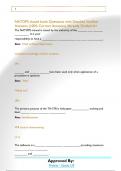
NATOPS closed book Questions with Detailed Verified Answers (100% Correct Answers) /Already Graded A+
NATOPS closed book Questions with Detailed Verified Answers (100% Correct Answers) /Already Graded A+NATOPS closed book Questions with Detailed Verified Answers (100% Correct Answers) /Already Graded A+NATOPS closed book Questions with Detailed Verified Answers (100% Correct Answers) /Already Graded A+
- Exam (elaborations)
- • 22 pages •
NATOPS closed book Questions with Detailed Verified Answers (100% Correct Answers) /Already Graded A+NATOPS closed book Questions with Detailed Verified Answers (100% Correct Answers) /Already Graded A+NATOPS closed book Questions with Detailed Verified Answers (100% Correct Answers) /Already Graded A+
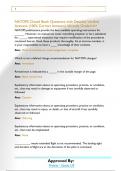
NATOPS Closed Book Questions with Detailed Verified Answers (100% Correct Answers) /Already Graded A+
NATOPS Closed Book Questions with Detailed Verified Answers (100% Correct Answers) /Already Graded A+NATOPS Closed Book Questions with Detailed Verified Answers (100% Correct Answers) /Already Graded A+NATOPS Closed Book Questions with Detailed Verified Answers (100% Correct Answers) /Already Graded A+
- Exam (elaborations)
- • 37 pages •
NATOPS Closed Book Questions with Detailed Verified Answers (100% Correct Answers) /Already Graded A+NATOPS Closed Book Questions with Detailed Verified Answers (100% Correct Answers) /Already Graded A+NATOPS Closed Book Questions with Detailed Verified Answers (100% Correct Answers) /Already Graded A+
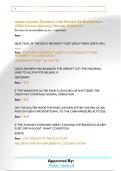
natops acoustics Questions with Detailed Verified Answers (100% Correct Answers) /Already Graded A+
natops acoustics Questions with Detailed Verified Answers (100% Correct Answers) /Already Graded A+natops acoustics Questions with Detailed Verified Answers (100% Correct Answers) /Already Graded A+natops acoustics Questions with Detailed Verified Answers (100% Correct Answers) /Already Graded A+natops acoustics Questions with Detailed Verified Answers (100% Correct Answers) /Already Graded A+natops acoustics Questions with Detailed Verified Answers (100% Correct Answers) /Already Grad...
- Exam (elaborations)
- • 27 pages •
natops acoustics Questions with Detailed Verified Answers (100% Correct Answers) /Already Graded A+natops acoustics Questions with Detailed Verified Answers (100% Correct Answers) /Already Graded A+natops acoustics Questions with Detailed Verified Answers (100% Correct Answers) /Already Graded A+natops acoustics Questions with Detailed Verified Answers (100% Correct Answers) /Already Graded A+natops acoustics Questions with Detailed Verified Answers (100% Correct Answers) /Already Grad...
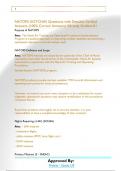
NATOPS GOTCHAS Questions with Detailed Verified Answers (100% Correct Answers) /Already Graded A+
NATOPS GOTCHAS Questions with Detailed Verified Answers (100% Correct Answers) /Already Graded A+
- Exam (elaborations)
- • 34 pages •
NATOPS GOTCHAS Questions with Detailed Verified Answers (100% Correct Answers) /Already Graded A+
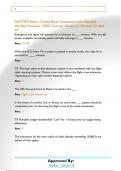
NATOPS Exam: Closed Book Questions with Detailed Verified Answers (100% Correct Answers) /Already Graded A+
NATOPS Exam: Closed Book Questions with Detailed Verified Answers (100% Correct Answers) /Already Graded A+NATOPS Exam: Closed Book Questions with Detailed Verified Answers (100% Correct Answers) /Already Graded A+NATOPS Exam: Closed Book Questions with Detailed Verified Answers (100% Correct Answers) /Already Graded A+
- Exam (elaborations)
- • 17 pages •
NATOPS Exam: Closed Book Questions with Detailed Verified Answers (100% Correct Answers) /Already Graded A+NATOPS Exam: Closed Book Questions with Detailed Verified Answers (100% Correct Answers) /Already Graded A+NATOPS Exam: Closed Book Questions with Detailed Verified Answers (100% Correct Answers) /Already Graded A+
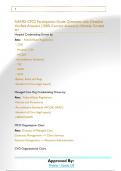
NAMSS CPCS Participation Guide Questions with Detailed Verified Answers (100% Correct Answers) /Already Graded A+
NAMSS CPCS Participation Guide Questions with Detailed Verified Answers (100% Correct Answers) /Already Graded A+
- Exam (elaborations)
- • 11 pages •
NAMSS CPCS Participation Guide Questions with Detailed Verified Answers (100% Correct Answers) /Already Graded A+
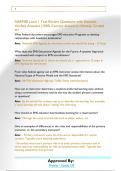
NAEMSE Level 1 Test Review Questions with Detailed Verified Answers (100% Correct Answers) /Already Graded A+
NAEMSE Level 1 Test Review Questions with Detailed Verified Answers (100% Correct Answers) /Already Graded A+NAEMSE Level 1 Test Review Questions with Detailed Verified Answers (100% Correct Answers) /Already Graded A+NAEMSE Level 1 Test Review Questions with Detailed Verified Answers (100% Correct Answers) /Already Graded A+NAEMSE Level 1 Test Review Questions with Detailed Verified Answers (100% Correct Answers) /Already Graded A+
- Exam (elaborations)
- • 10 pages •
NAEMSE Level 1 Test Review Questions with Detailed Verified Answers (100% Correct Answers) /Already Graded A+NAEMSE Level 1 Test Review Questions with Detailed Verified Answers (100% Correct Answers) /Already Graded A+NAEMSE Level 1 Test Review Questions with Detailed Verified Answers (100% Correct Answers) /Already Graded A+NAEMSE Level 1 Test Review Questions with Detailed Verified Answers (100% Correct Answers) /Already Graded A+
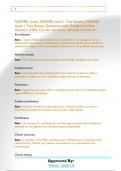
NAEMSE vocab, NAEMSE Level 1 Test Review, NAEMSE Level 1 Test Review Questions with Detailed Verified Answers (100% Correct Answers) /Already Graded A+
NAEMSE vocab, NAEMSE Level 1 Test Review, NAEMSE Level 1 Test Review Questions with Detailed Verified Answers (100% Correct Answers) /Already Graded A+ NAEMSE vocab, NAEMSE Level 1 Test Review, NAEMSE Level 1 Test Review Questions with Detailed Verified Answers (100% Correct Answers) /Already Graded A+ NAEMSE vocab, NAEMSE Level 1 Test Review, NAEMSE Level 1 Test Review Questions with Detailed Verified Answers (100% Correct Answers) /Already Graded A+
- Exam (elaborations)
- • 31 pages •
NAEMSE vocab, NAEMSE Level 1 Test Review, NAEMSE Level 1 Test Review Questions with Detailed Verified Answers (100% Correct Answers) /Already Graded A+ NAEMSE vocab, NAEMSE Level 1 Test Review, NAEMSE Level 1 Test Review Questions with Detailed Verified Answers (100% Correct Answers) /Already Graded A+ NAEMSE vocab, NAEMSE Level 1 Test Review, NAEMSE Level 1 Test Review Questions with Detailed Verified Answers (100% Correct Answers) /Already Graded A+
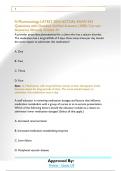
N Pharmacology LATEST 2024 ACTUAL EXAM 242 Questions with Detailed Verified Answers (100% Correct Answers) /Already Graded A+
N Pharmacology LATEST 2024 ACTUAL EXAM 242 Questions with Detailed VN Pharmacology LATEST 2024 ACTUAL EXAM 242 Questions with Detailed Verified Answers (100% Correct Answers) /Already Graded A+N Pharmacology LATEST 2024 ACTUAL EXAM 242 Questions with Detailed Verified Answers (100% Correct Answers) /Already Graded A+N Pharmacology LATEST 2024 ACTUAL EXAM 242 Questions with Detailed Verified Answers (100% Correct Answers) /Already Graded A+N Pharmacology LATEST 2024 ACTUAL EXAM 242 Que...
- Exam (elaborations)
- • 160 pages •
N Pharmacology LATEST 2024 ACTUAL EXAM 242 Questions with Detailed VN Pharmacology LATEST 2024 ACTUAL EXAM 242 Questions with Detailed Verified Answers (100% Correct Answers) /Already Graded A+N Pharmacology LATEST 2024 ACTUAL EXAM 242 Questions with Detailed Verified Answers (100% Correct Answers) /Already Graded A+N Pharmacology LATEST 2024 ACTUAL EXAM 242 Questions with Detailed Verified Answers (100% Correct Answers) /Already Graded A+N Pharmacology LATEST 2024 ACTUAL EXAM 242 Que...
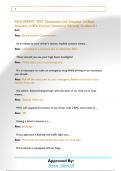
MVA PERMIT TEST Questions with Detailed Verified Answers (100% Correct Answers) /Already Graded A+
MVA PERMIT TEST Questions with Detailed Verified Answers (100% Correct Answers) /Already Graded A+MVA PERMIT TEST Questions with Detailed Verified Answers (100% Correct Answers) /Already Graded A+MVA PERMIT TEST Questions with Detailed Verified Answers (100% Correct Answers) /Already Graded A+MVA PERMIT TEST Questions with Detailed Verified Answers (100% Correct Answers) /Already Graded A+MVA PERMIT TEST Questions with Detailed Verified Answers (100% Correct Answers) /Already Graded A+
- Exam (elaborations)
- • 13 pages •
MVA PERMIT TEST Questions with Detailed Verified Answers (100% Correct Answers) /Already Graded A+MVA PERMIT TEST Questions with Detailed Verified Answers (100% Correct Answers) /Already Graded A+MVA PERMIT TEST Questions with Detailed Verified Answers (100% Correct Answers) /Already Graded A+MVA PERMIT TEST Questions with Detailed Verified Answers (100% Correct Answers) /Already Graded A+MVA PERMIT TEST Questions with Detailed Verified Answers (100% Correct Answers) /Already Graded A+
